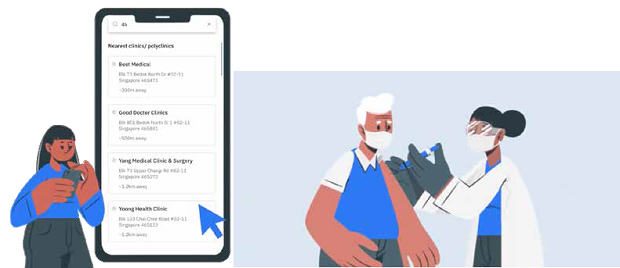
It will only take one minute to book recommended vaccines, thanks to a new hassle-free Health Appointment System.
Pneumonia is the third leading cause of death in Singapore, claiming more than 4,000 lives each year, with over a quarter of pneumonia cases estimated to be due to pneumococcus bacteria. Yet, only 14 percent of Singaporeans above the age of 65 have protected themselves with both doses of pneumococcal vaccines.
Pneumococcal vaccines are recommended under the National Adult Immunisation Schedule (NAIS). The NAIS provides guidance on vaccinations that adults should adopt to protect themselves against vaccine-preventable diseases such as influenza, pneumococcal disease, human papillomavirus (HPV) and hepatitis B.
Certain adults are at increased risk of complications or are susceptible to vaccine-preventable diseases, if they have not previously received the vaccination and are in contact with individuals who have the infection. Vaccinations recommended under the NAIS aim to prevent such infections among susceptible individuals and reduce complications, morbidity and mortality.
The Ministry of Health provides subsidies for specific brands of vaccines recommended in the National Childhood Immunisation Schedule (NCIS) and the NAIS at public hospitals, specialist outpatient clinics, polyclinics and Community Health Assist Scheme (CHAS) general practitioner (GP) clinics to improve affordability for vaccinations for Singaporeans.
A key factor in the low take-up rate was accessibility, according to a study by Open Government Products (OGP), a modern tech team within the Singapore Government that builds technology for the public good. Many feel that it is too tedious and time-consuming to get a vaccine, said Mr Kenneth Sng (pictured below), product manager at OGP.

To make it easier for individuals, especially the elderly, to receive their vaccine, OGP has developed a new Health Appointment System (HAS), which directly connects patients to hundreds of CHAS GP clinics to simplify and accelerate the vaccination process.
For its initial launch, the Health Promotion Board has reached out to more than 600,000 eligible elderly people via a nationwide letter-sending campaign to invite them to take their CHAS-subsidised pneumococcal vaccines.
Launched in mid-August this year, this hassle-free system allows users to book an appointment for vaccination in just one minute. Patients simply have to scan a QR code to access the HAS, or visit book.health.gov.sg and indicate their postal code to be directed to their nearest CHAS GP clinics with available time slots. After the appointment is secured, wait-time at the clinic is reduced to less than 15 minutes for the patient.

“Previously, without HAS, you would also need to find out if the clinic is CHAS-accredited and if it provides subsidy for the vaccine,” said Dr Shawn Tan (pictured above), a GP at Loh & Loh Clinic and Surgery, whose clinic was among the first to sign up for the new HAS.
This system benefits clinics and patients alike by making it easy to schedule appointments, as clinics may also choose to offer vaccination during non-peak hours to ease the patient load while doctors have more time to answer patients’ questions regarding vaccination.
“I have often had to forgo advising patients on the benefits of vaccination because they came during a busy period for a separate issue such as a rash or flu. They ended up not taking the NAIS vaccines or delaying them unnecessarily. I am glad that we can now allocate time to focus on preventive care,” said Dr Tan.
To date, more than 600 CHAS GP clinics — which is more than half of all CHAS GP clinics in Singapore — have enrolled in the new HAS. OGP hopes to onboard more clinics progressively.
During this pilot phase, only pneumococcal vaccines are available. If the pilot is successful, the goal is to eventually include all NAIS and NCIS vaccines, including the HPV vaccine for women under the age of 26 to reduce their risk of cervical cancer.
“Each year, approximately 309 women in Singapore are diagnosed with cervical cancer. It is the second leading cause of cancer deaths among women in their 30s here. If taken before the age of 17, HPV vaccines can reduce the chances of developing cervical cancer by almost 90 per cent. If the HAS can raise HPV vaccination rates, we would save hundreds of lives each year,” said Mr Sng.
Get the latest updates about Singapore Health in your mailbox! Click here to subscribe.













 Get it on Google Play
Get it on Google Play